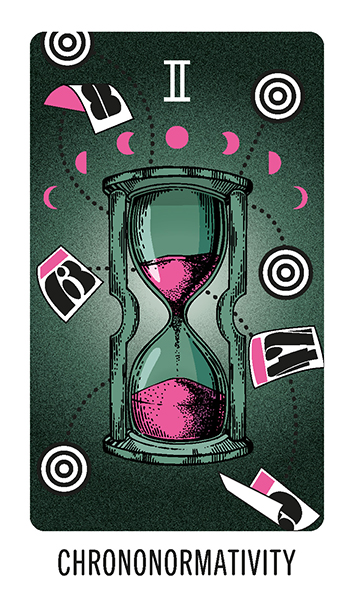Chrononormativity
Shake up your hourglass, wind up your clock and let’s liberate our timelines!
Chrononormativity is the expectation that we all follow the same timeline, that there’s the same right thing at the right time for everybody.
The word was first used by Elizabeth Freeman in Time Binds: Queer Temporalities, Queer Histories
Some of the team behind Adventures in Time and Gender worked on a time travel story with young trans people in 2014. “Transvengers” was a web comic created for The Wellcome Collection.
In Adventures in Time and Gender, we looked back to the sexologists of the late 20th century, who were in turn looking back to ancient Greek mythology. Our character Suitcase talks about their wormhole in Episode 1
“The reason I think this wormhole could be of interest to a young gendery person living in the UK today, such as yourself. The wormhole goes backwards to explore history but also forwards from Hirschfeld. There is a direct line through time connecting the ideas formulated by the sexologists to the way trans people seeking medical interventions are treated today.
So, say you were going through a Gender Identity Clinic in 2020, you are part of a system of medicalisation and diagnosis with its origins in the late 19th century. And here’s the thing, I wonder if you understand why the system works in the way it does, where the thinking came from, then maybe you can critique it.”
Who controls what history is told and how it’s told?
But we know trans history has been erased, as with the burning of Hirschfeld’s Institute of Sexology
CN Lester talks about Cultural Amnesia and the shock of the new in this keynote address from 2017. Why is it that when trans people achieve things, we are reported as “the first”? CN suggests it’s a ploy to stop us ever establishing ourselves, that we are always reported as being the shock of the new.
From So Mayer’s book A Nazi word for a Nazi thing
“What is fragmented by fascism is folded by gender/queerness. Fascism insists on and through its authoritarian history, eradicating any contesting accounts, especially personal and cultural memories. A non-linear experience of gender and sexuality, which “folds” me back into re-evaluation childhood experiences of my self and its context, teaches me how to gather and be gathered by a complex history.”
Could a trans experience of time – non linear, folding not tearing, re-visiting and re-evaluating – be a creative force?
EXERCISE – THE RIGHT TIME
What ideas do you have about the “right time” to have done some thing or not done something by? All around us there are messages about normality and time. This might be as small as what time of the day its usual to eat breakfast or as big as what period in our life we are supposed to have achieved independence by or established a career by. Lots of ideas about how we should use our time and what we should have achieved by a certain period of our life become internalised, and we use them to evaluate if we are successful enough, normal enough, valuable enough.
We absorb ideas about time and being trans too. What ideas do you have about “the right time” to socially and/or medically transition? Do you have ideas about it being too late or too early to do certain things? How did you get these ideas? How is time becoming a policing factor in the decisions you make and conclusions you draw about what’s possible for you?
Trans people have an inherent way of messing with time…… – trans years, two puberties – multiplicity of dates in the recording of a trans life.
Trans people can worry that they have wasted time….. too old to transition, why didn’t I do it sooner, how could things have been different if…..
Draw a timeline of your coming to know yourself as trans or gender questioning. At what points do you feel that you were somehow out of sync? You are invited to recalibrate your time story. Look across your timeline for periods where you spent your time wisely by:
- Dreaming and imaging your gender changes and possibilities (perhaps you are doing this currently)
- Researching and learning different gendered possibilities
- Preparing and readying for what was yet to come
- Gathering and waiting for what could be
- Experimenting and testing out different possibilities for who you could become
- Waiting and extending patience
- Enjoying life on a different track
What’s it like to know that your time was always productively pointing to where you are now?
No one feels that they managed time exactly right, and yet here you are – right on time.

